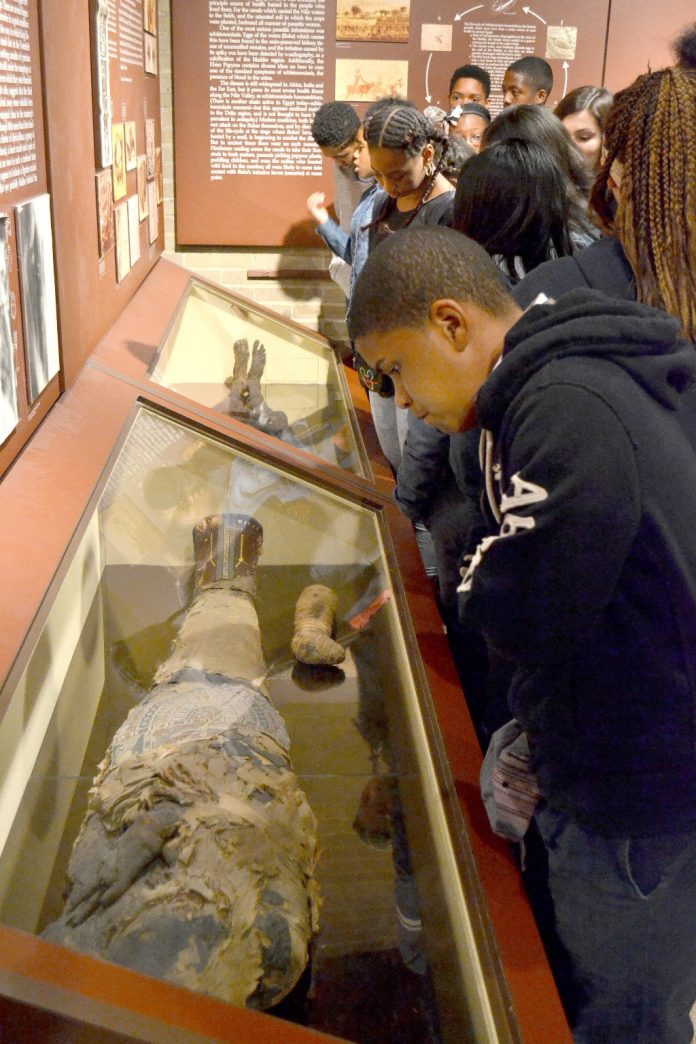A hands-on lesson: Penn Museum will be bringing instruction about ancient Egypt to city schools, as well as bringing school kids to the museum. Above, a student observes a mummy at the University of Pennsylvania Museum of Archaeology and Anthropology. PHOTO COURTESY OF PENN MUSEUM
The Penn Museum will be putting some mummies into the lives of Philadelphia’s public school kids this year.
Thanks to a $1 million lead grant from GRoW Annenberg, a program of the Annenberg Foundation, the West Philadelphia museum will be bringing instruction about ancient Egypt and the Roman Empire to city public and charter schools, and probably most important, bringing school kids and their families to the museum for first-hand looks at its treasures.
The curators and staff of the University of Pennsylvania Museum of Archaeology and Anthropology are hoping to give the kids and their kin some unforgettable experiences.
“Unpacking the Past” will be available to seventh-graders in district schools as well as those enrolled in Mastery Charter Schools and the Knowledge Is Power Program, according to Ellen Owens, the museum’s director of learning programs.
According to the museum, “Students can discover more about the ancient past, all while tapping into ‘common core’ curriculum standards in language art, math and science.”
And they get to learn how mummies are made, Owens said.
The students and their families get free one-year memberships to the museum at 3260 South St.
The program also includes professional development training for teachers, in-school pre-visits in a “mummy mobile,” interactive museum field trips that afford the kids gallery tours and workshop experiences, and student projects. The museum hopes to eventually reach 10,000 students and their teachers in each of the program’s three years.
ldquo;As an internationally renowned resource for studying and learning about the world, the Penn Museum has a mission to transform understanding of our shared human experience,” said Julian Siggers, the museum’s director. “This multifaceted educational program in an object-based museum environment — with touch points for teachers, students and families — has multiple opportunities for those exceptional revelations that can be the sparks to inspire lifelong learning.”
Owens said museum staffers will be visiting many schools in the Northeast and in Fishtown. They’ve already taken their outreach program to the Stephen Decatur School on Academy Road, she said.
The program at Decatur gave the kids an understanding of ancient Egypt and archaeology, she said, and the pupils were encouraged to “think like an archaeologist.”
Museum staff brought along materials for teachers, and the kids will get a tour of the museum’s galleries on Nov. 7. That museum visit is the program’s centerpiece, especially since it will focus on ancient Egypt and will include a “mummy makers workshop” in which the students will assist educators as they move through the mummification process on a custom-made “mummy dummy.”
That workshop includes scrambling the dummy’s gelatin brains, Owens said.
“The kids love it,” she added.
Along with all the faux gory fun, the kids are learning about history, science and critical thinking, Owens said.
After their museum visits, teachers are invited to work on final student projects and online resources to build upon student interests through extension lessons.
Owens said some examples of student projects are:
• Students will work on stories about what it was like to live in ancient Egypt.
• They study ancient religious practices and beliefs.
• They’ll study the environment of ancient Egypt.
Teachers interested in Unpacking the Past can contact Emily Hirshorn at 215–898–4033 or email [email protected]
For more information, visit www.penn.museum/educators-k-12.html





